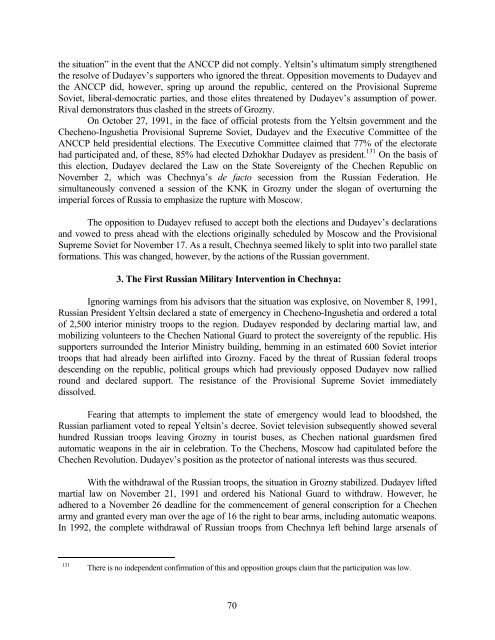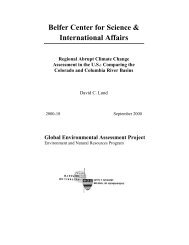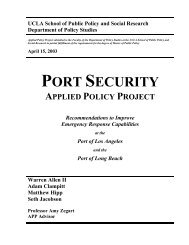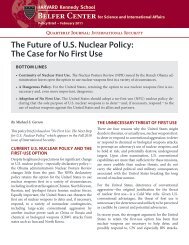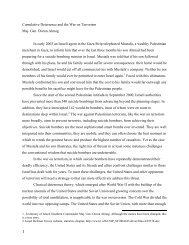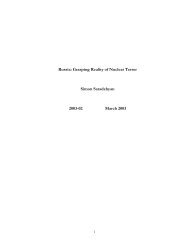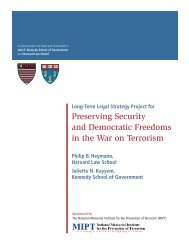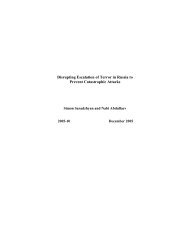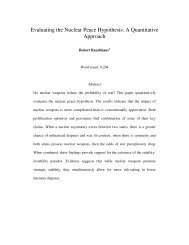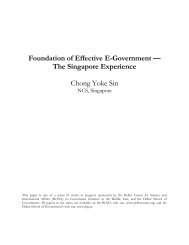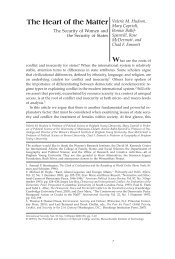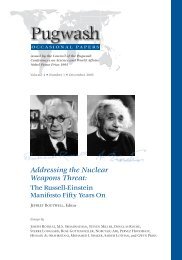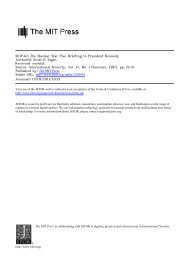RUSSIA'S TINDERBOX - Belfer Center for Science and International ...
RUSSIA'S TINDERBOX - Belfer Center for Science and International ...
RUSSIA'S TINDERBOX - Belfer Center for Science and International ...
Create successful ePaper yourself
Turn your PDF publications into a flip-book with our unique Google optimized e-Paper software.
the situation” in the event that the ANCCP did not comply. Yeltsin’s ultimatum simply strengthened<br />
the resolve of Dudayev’s supporters who ignored the threat. Opposition movements to Dudayev <strong>and</strong><br />
the ANCCP did, however, spring up around the republic, centered on the Provisional Supreme<br />
Soviet, liberal-democratic parties, <strong>and</strong> those elites threatened by Dudayev’s assumption of power.<br />
Rival demonstrators thus clashed in the streets of Grozny.<br />
On October 27, 1991, in the face of official protests from the Yeltsin government <strong>and</strong> the<br />
Checheno-Ingushetia Provisional Supreme Soviet, Dudayev <strong>and</strong> the Executive Committee of the<br />
ANCCP held presidential elections. The Executive Committee claimed that 77% of the electorate<br />
had participated <strong>and</strong>, of these, 85% had elected Dzhokhar Dudayev as president. 131 On the basis of<br />
this election, Dudayev declared the Law on the State Sovereignty of the Chechen Republic on<br />
November 2, which was Chechnya’s de facto secession from the Russian Federation. He<br />
simultaneously convened a session of the KNK in Grozny under the slogan of overturning the<br />
imperial <strong>for</strong>ces of Russia to emphasize the rupture with Moscow.<br />
The opposition to Dudayev refused to accept both the elections <strong>and</strong> Dudayev’s declarations<br />
<strong>and</strong> vowed to press ahead with the elections originally scheduled by Moscow <strong>and</strong> the Provisional<br />
Supreme Soviet <strong>for</strong> November 17. As a result, Chechnya seemed likely to split into two parallel state<br />
<strong>for</strong>mations. This was changed, however, by the actions of the Russian government.<br />
3. The First Russian Military Intervention in Chechnya:<br />
Ignoring warnings from his advisors that the situation was explosive, on November 8, 1991,<br />
Russian President Yeltsin declared a state of emergency in Checheno-Ingushetia <strong>and</strong> ordered a total<br />
of 2,500 interior ministry troops to the region. Dudayev responded by declaring martial law, <strong>and</strong><br />
mobilizing volunteers to the Chechen National Guard to protect the sovereignty of the republic. His<br />
supporters surrounded the Interior Ministry building, hemming in an estimated 600 Soviet interior<br />
troops that had already been airlifted into Grozny. Faced by the threat of Russian federal troops<br />
descending on the republic, political groups which had previously opposed Dudayev now rallied<br />
round <strong>and</strong> declared support. The resistance of the Provisional Supreme Soviet immediately<br />
dissolved.<br />
Fearing that attempts to implement the state of emergency would lead to bloodshed, the<br />
Russian parliament voted to repeal Yeltsin’s decree. Soviet television subsequently showed several<br />
hundred Russian troops leaving Grozny in tourist buses, as Chechen national guardsmen fired<br />
automatic weapons in the air in celebration. To the Chechens, Moscow had capitulated be<strong>for</strong>e the<br />
Chechen Revolution. Dudayev’s position as the protector of national interests was thus secured.<br />
With the withdrawal of the Russian troops, the situation in Grozny stabilized. Dudayev lifted<br />
martial law on November 21, 1991 <strong>and</strong> ordered his National Guard to withdraw. However, he<br />
adhered to a November 26 deadline <strong>for</strong> the commencement of general conscription <strong>for</strong> a Chechen<br />
army <strong>and</strong> granted every man over the age of 16 the right to bear arms, including automatic weapons.<br />
In 1992, the complete withdrawal of Russian troops from Chechnya left behind large arsenals of<br />
131 There is no independent confirmation of this <strong>and</strong> opposition groups claim that the participation was low.<br />
70


